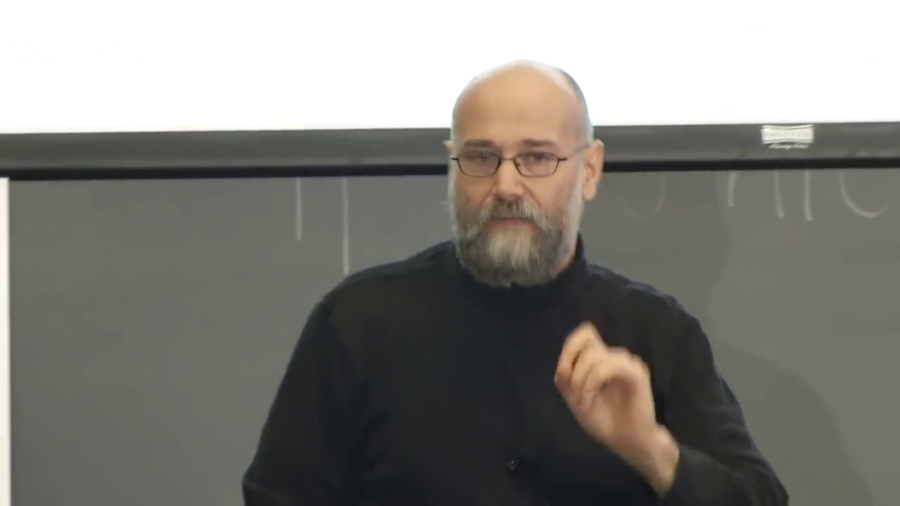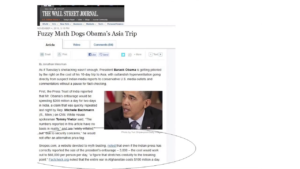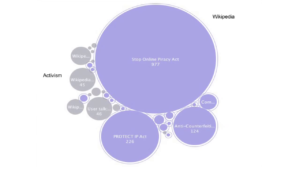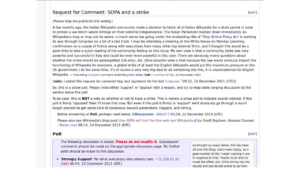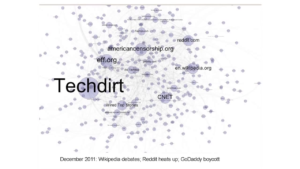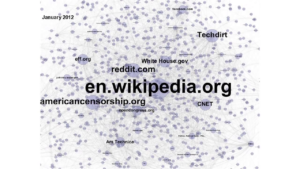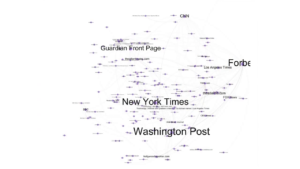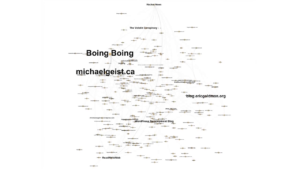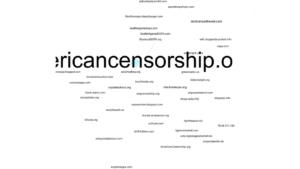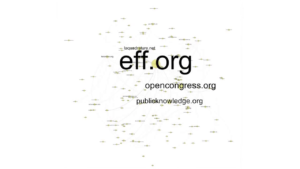Susan Crawford: To talk to us about the power of networks, we’re very fortunate to have Yochai Benkler with us, who is a co-director of the Berkman Center, author of one of the best books about the Internet age, The Wealth of Networks, and a sought-after speaker and opiner on all things digital. So please join me in welcoming Yochai Benkler.
Yochai Benkler: Thanks, Susan. We’re extremely lucky to have you. I think Jenny probably wanted about three slides. I figured in my case that meant…not much more than three per minute. I want to tell you four stories from my research and our research here in the last two years that exhibit different aspects of both the problem and at least classes of solutions that we see in the net.
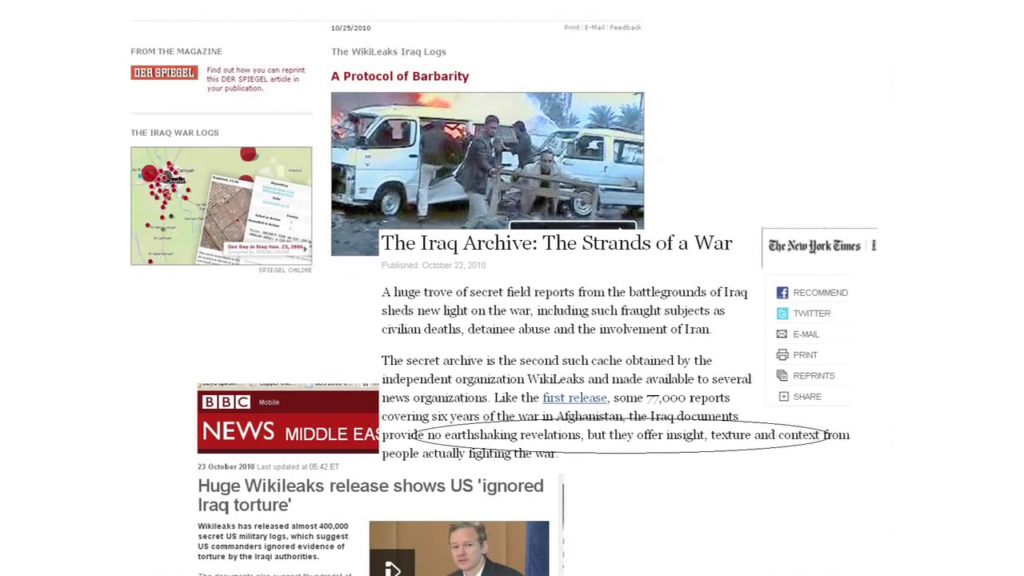
So the first one is this one. The question of national security, and government propaganda and misinformation. This happens to— By the way, “no earthshaking revelations, but offer texture, insight and context” is The New York Times versus “A Protocol of Barbarity” by Der Spiegel, and “Huge WikiLeaks releases shows US ‘ignored Iraq torture.’ ” It’s just a question of framing, really.
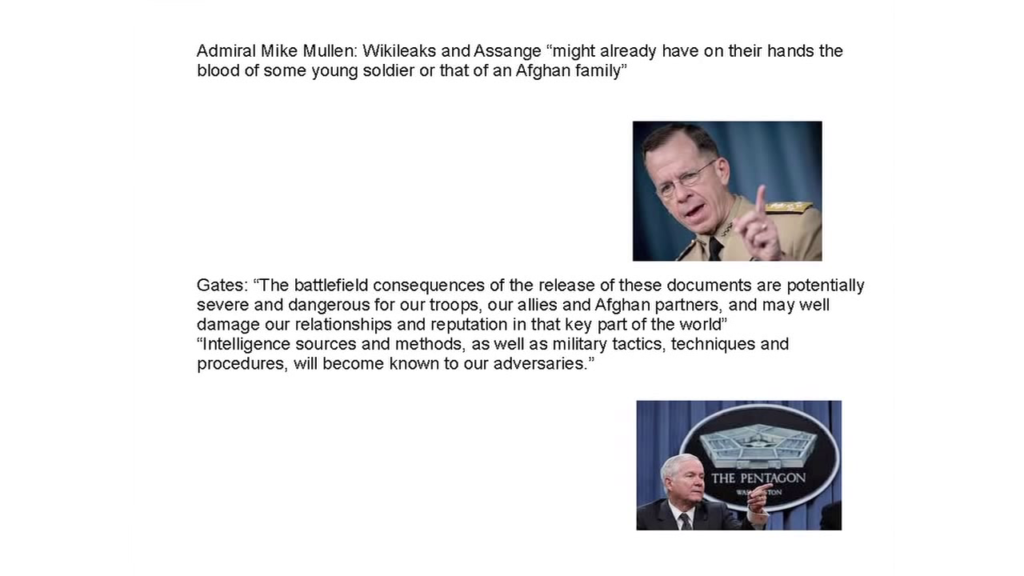
But let’s set that aside. The question of this, one of the major leaks and news stories and how it was treated by the administration. So Admiral Mike Mullen: “WikiLeaks and Assange might already have on their hands the blood of some young soldier or that of an Afghan family.” Secretary Gates: The battlefield consequences are potentially severe and dangerous for our troops,” etc. “Intelligence sources and methods,” etc.
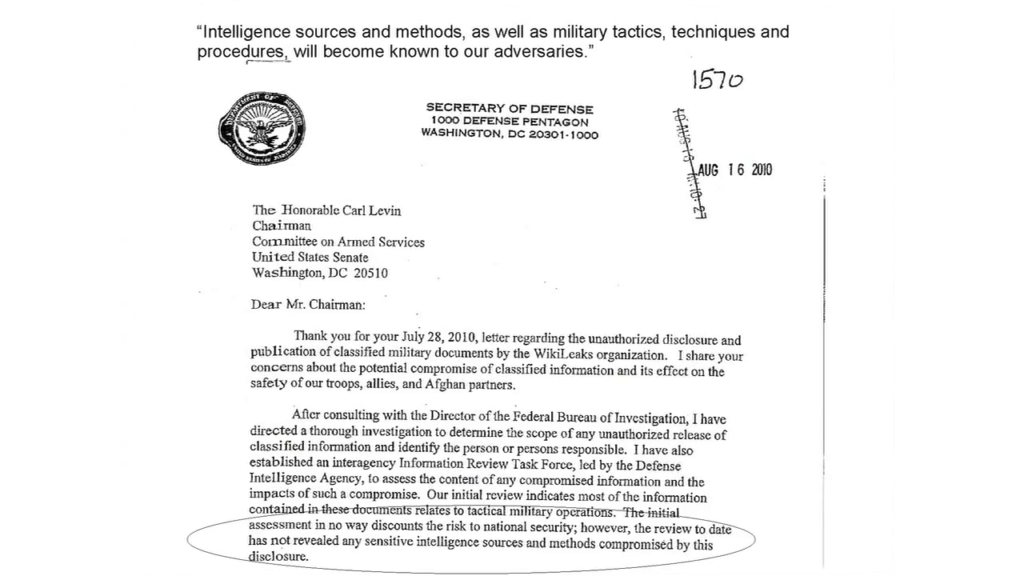
When actually required by the Senate to write down what the problems were, the basic answer is, “the review to date has not revealed any sensitive intelligence sources and methods compromised.” We’ll see what comes out in Bradley Manning’s trial as they try to actually make the damage case.
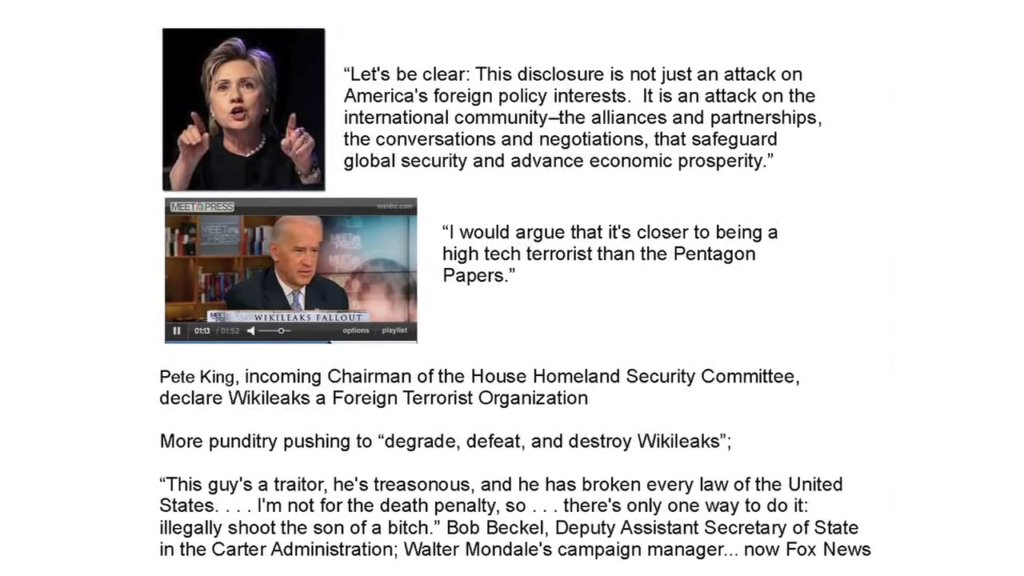
Secretary Clinton: “Let’s be clear: This disclosure is not just an attack on America’s foreign policy, it’s an attack on the international community.
Vice President Biden: “I would argue that it’s closer to being a high tech terrorist than the Pentagon Papers.”
And so on and so forth.
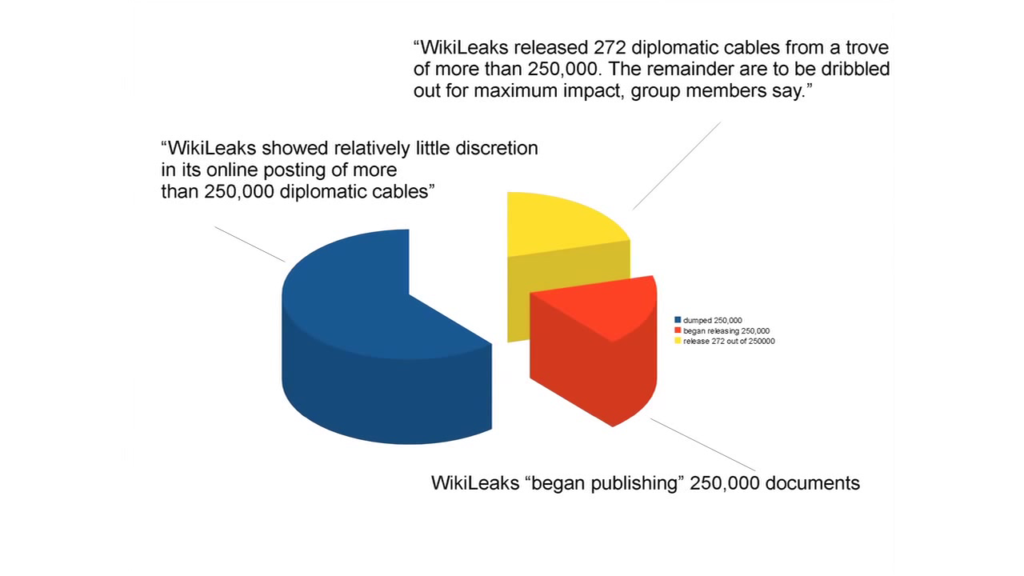
Well, at least we have the Fourth Estate. Two thirds of stories in the first two weeks in national security from the Lexis database have some version of the story of “WikiLeaks showed relatively little discretion in its online posting or more than 250,000 cables.” Only one sixth had roughly the shape of, “WikiLeaks released 272 diplomatic cables from a trove of over 250,000. The remainder to be dribbled out for greater effect.”
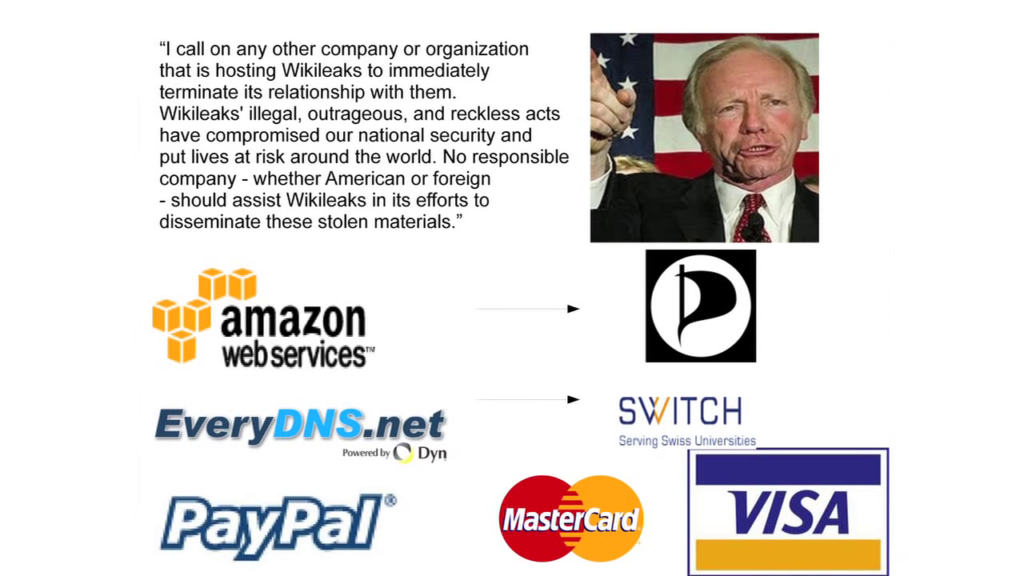
Vastly different affect. The different affect allowed this to happen, which is to say Senator Lieberman, with quiet acceptance from the government, basically says to companies, “Stop serving WikiLeaks.” And Amazon chucks them off, EveryDNS chucks them off. These are solutions, where the solution is not informational, it’s simply resistance. Making the information persistent despite efforts to shut it down. That can’t work for everything; payment systems. It is still the case almost two years later, no known effect and no money sent to WikiLeaks. Here the question is what forms of resistance to action are feasible in a context of a supine, traditional medium in the context of national security from statements from the state.
When I say “supine system” we look at roles of media as well. So Bill Keller ends his story in the The New York Times Magazine as, “If Assange were an understated professorial type rather than a character from a missing Stieg Larsson novel, and if WikiLeaks were not suffused with such glib antipathy toward the US, would the reaction to the leaks be quite so ferocious?”
Good question. Who’s responsible? Half an article before, Keller says, “I came to think of Julian Assange as a character from a Stieg Larsson movie.
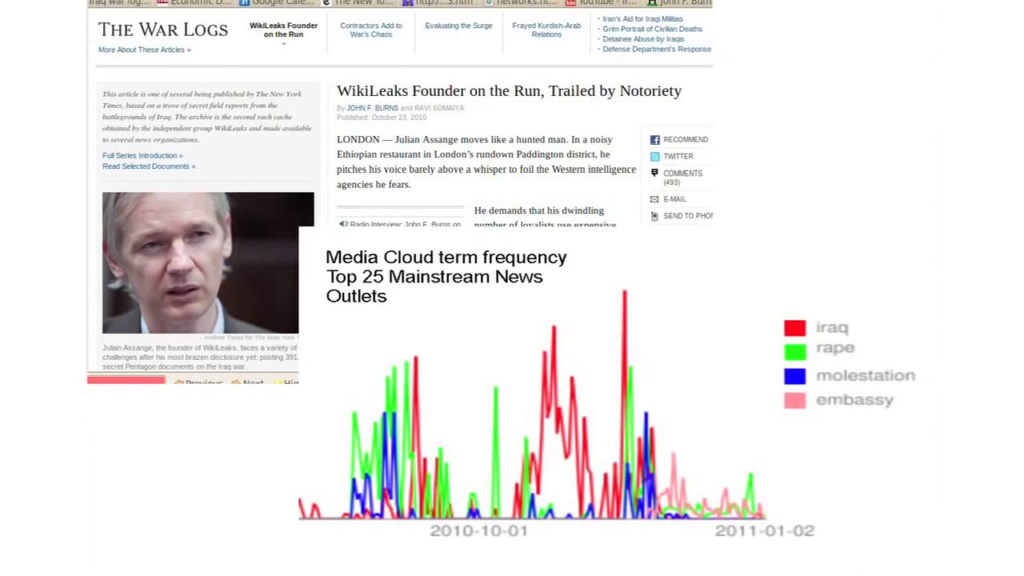
So where do we look at the media? On the same day that [?] comes out, we have this front-page story of “WikiLeaks Founder on the Run, Trailed by Notoriety.” If you look at frequency of terms from our Media Cloud database of “Iraq” and “embassy” and “rape” and “molestation,” you see a persistent interference pattern by looking for the sex and the violence rather than the violence and the torture. Story One.
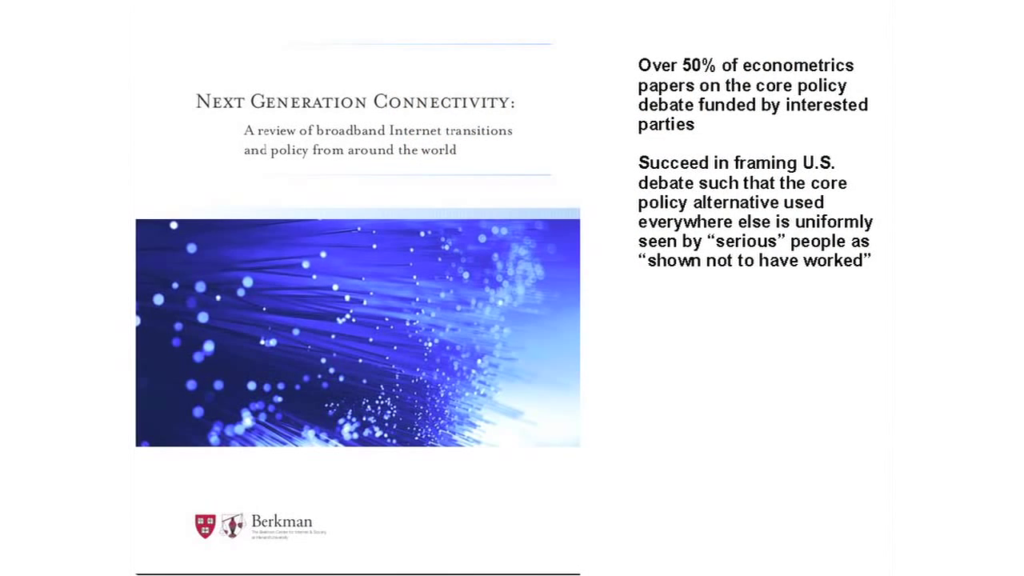
Story Two. A couple of years ago the FCC asked us to help them with a national broadband plan, and the Ford Foundation funded us to do this major report. One of the core problems in understanding what’s going elsewhere and importing it here was the fact that for a decade, over half the econometric studies about the effects of the most important policy option that the US decided not to take were funded by industry and came 100% on the side of whoever funded them. This took the really interesting policy question and made it so that serious people in the US couldn’t say it’s feasible, because all the evidence is against it.
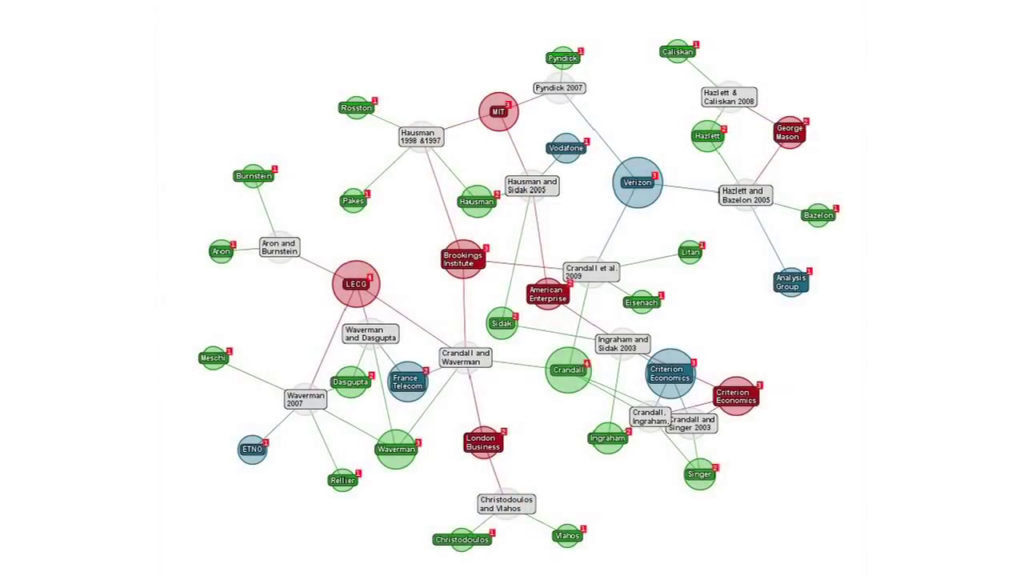
This is work with Laura Miyakawa when she was still here. If you begin to map the papers and the funding, what you see is a combination of consultancies like Criterion Economics or the Analysis Group, together with accreditation of Brookings Institute or American Enterprise Institute, with authors who are both in the consulting world and in the think tanks as well as the universities. And you get the funding and the accreditation coming out with a persistent set of answers that are always on the side of whoever funded them.
The answer to this, if we can develop something on the net, has to be some form of peer review. Whether it’s a web site that gets graduate students to look at this data. Whether that’s the model or something along those lines.
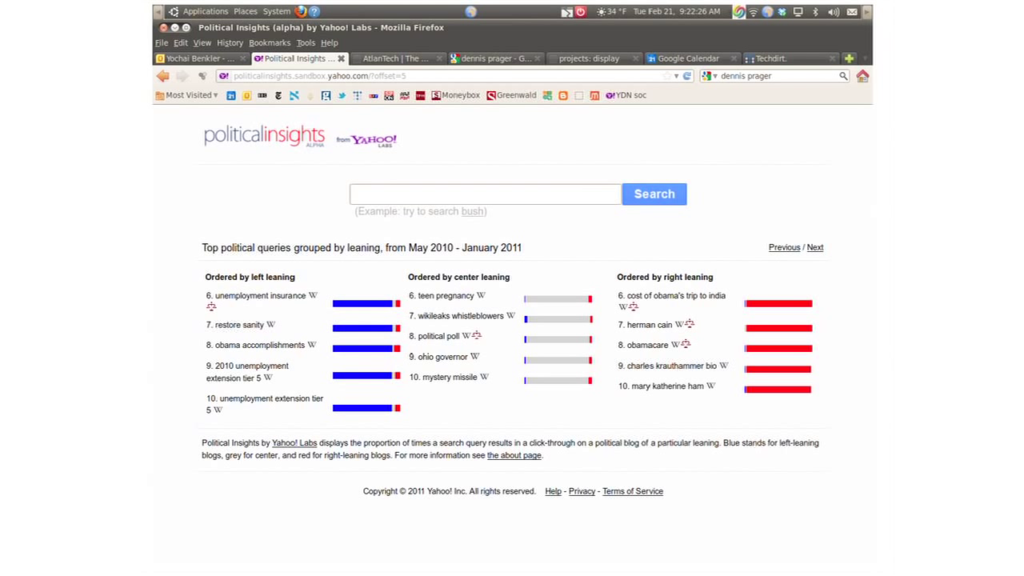
Story Three. The sixth most-searched term which was followed by a click on the right wing blogosphere in 2010 was a search for the cost of Obama’s trip to India. The major claim that the trip cost $200 million a day, it started out… So this is a great candidate for the Web spreads fear. And indeed Tom Friedman writes to us “Too Good to Check.” The story’s too good to check. “Anderson Cooper did the country a favor. He expertly deconstructed on his CNN show a bogus rumor that President Obama’s trip… Where does the rumor come from? In case you missed it a story circulated around the Web, etc.”
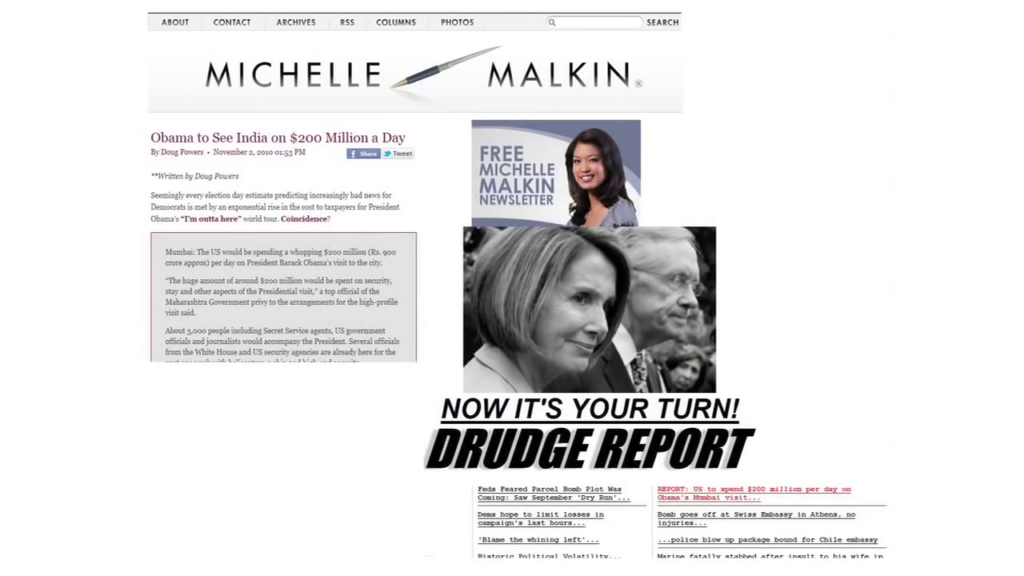
Indeed, two blog posts on November 2 linked to one of India’s most respected news sites claiming this story. These two top sites plus three small sites. Three hours later, however, it was Rush Limbaugh. And that night it was Mike Huckabee on election night report, who amped things up.
So then who deconstructed it? Well, it wasn’t traditional media. This is the next day. A major piece on the new Obama royalty on Fox News. Hours after these had already come out on the Web. So FactCheck goes and does a very careful analysis—factcheck.org. MediaMatters does. Snopes.com does. So, academically-based, nonprofit-supported organizations, as well as a commercial web site all debunked it such that by the middle of the day on November 4, seven or eight hours before Cooper’s response, we already have a Wall Street Journal blog post that includes the debunking and directly cites both Snopes and FactCheck with links. One who did the research, as Tom Friedman says, “too good to check” that the story is that the Web is nonsense and traditional media and reporting is good.
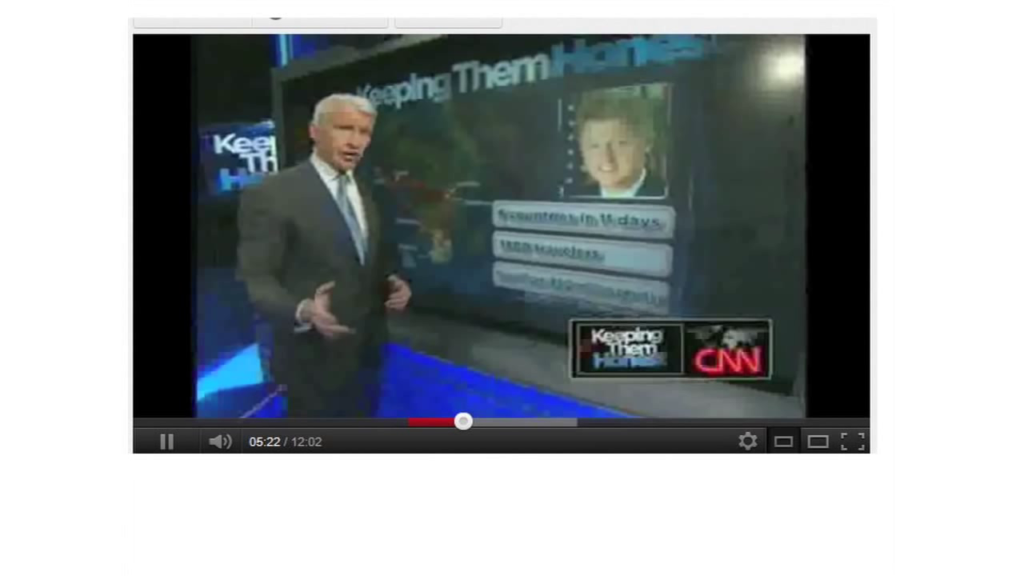
So in fact Anderson Cooper seven hours later has this story. As you see, he’s comparing it to the Clinton trip in the late 90s, which is a great way of doing it, just like factcheck.org did a day a half earlier, just without citation.
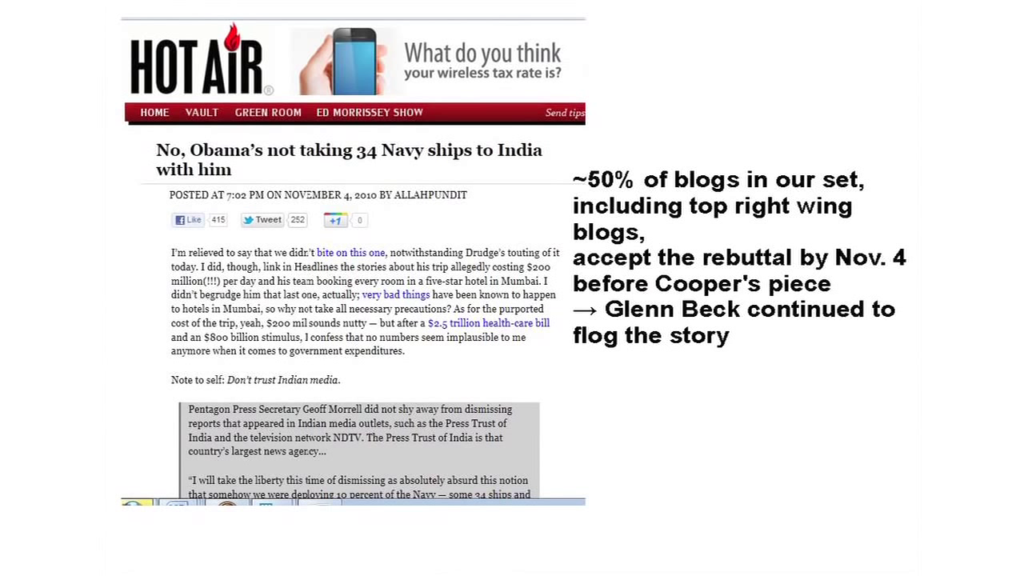
The Web on the other hand, hours before Cooper… In our set, at least half the blogs, including the top right wing, were already linking to the debunking. It was only Glenn Beck who kept repeating the lie. So whether lying is easier or harder is a different question.
Story Four, and it’s a completely different story and a completely different understanding. And that’s the story of the SOPA/PIPA organization. And it goes not so much the fact-checking as to basic framing of a core policy question through a mobilized network of political and informational work.
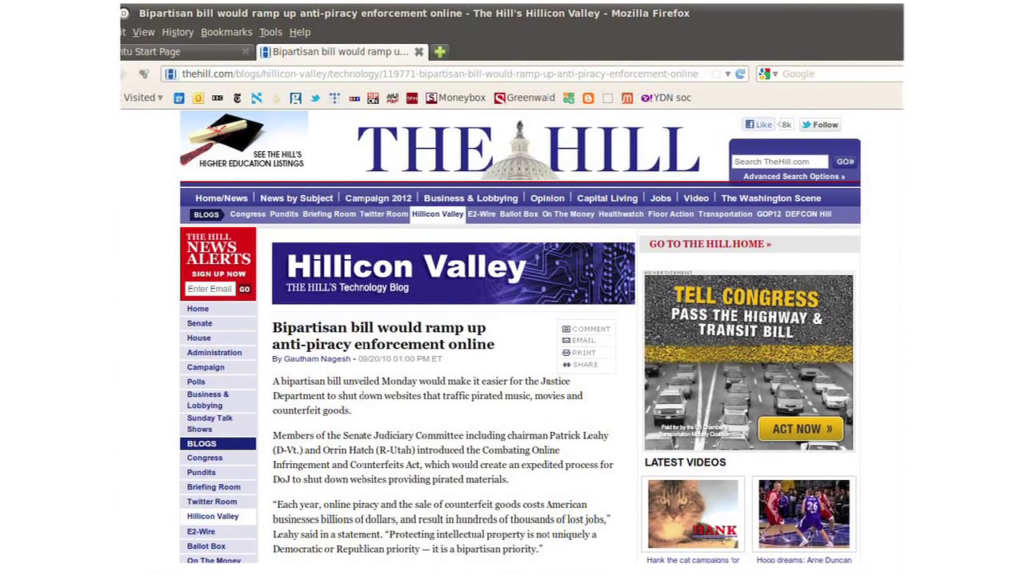
So you start when the bill gets introduced in this story on The Hill in September of 2010. A bipartisan bill unveiled Monday would make it easier for the Justice Department to shut down web sites that traffic pirated music, movies, and counterfeit goods. Members of the Senate Judiciary Committee including Chairman Patrick Leahy and Orrin Hatch, etc…introduced, etc.… Quote:
“Each year, online piracy and the sale of counterfeit goods costs American businesses billions of dollars, and result in hundreds of thousands of lost jobs,” Leahy said in a statement. “Protecting intellectual property is not uniquely a Democratic or Republican priority—it is a bipartisan priority.”
Bipartisan bill would ramp up anti-piracy enforcement online, Gautham Nagesh, The Hill, 09/20/2010 [since edited]
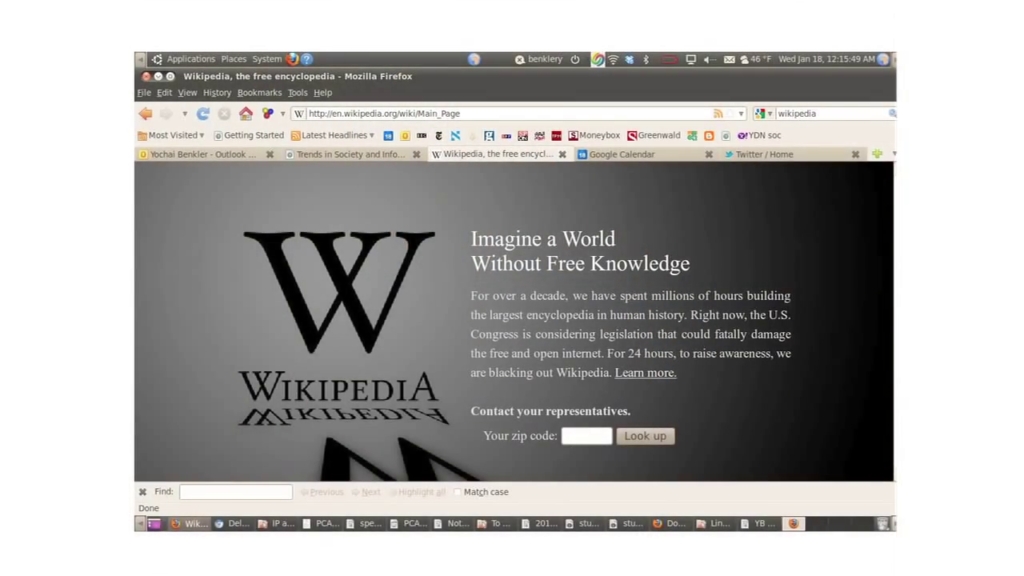
Fourteen months later, Wikipedia is shut down and its front page says “Imagine a World Without Free Knowledge.” How did this piece of legislation move from being something that is neither a Democratic nor Republican story to “imagine a world without free knowledge?” That’s a story.
One version of the story is a simple debunking story, and you can tell that. So for example, the $58 billion that’s claimed that the industry is losing $58 billion from piracy. That was debunked. It was stated in The Hill in that particular story. It’s later repeated in various places, including The New York Times. It gets debunked online. So you’ve got this particular story in Cato linking to The New York Times story and saying, “here are the problems.” Here’s the actual original article by the consultancy firm, as we saw in broadband as well, making these bogus numbers. Here are the links to all of the figures, etc. that make it wrong. Here’s a link to the GAO report that a year and a half ago already debunked this.
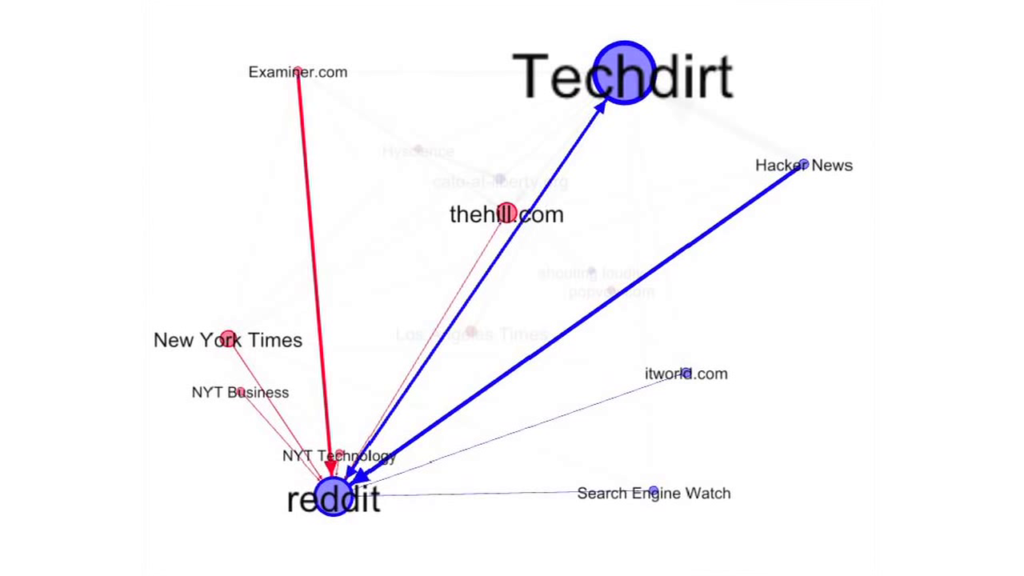
But Cato is not very well-known. However, there’s an attention backbone. Techdirt, which is very highly connected in this network, links to Cato, and the story goes from there as does a debunking of the same story on Reddit. So we see very highly connected nodes producing the debunking.
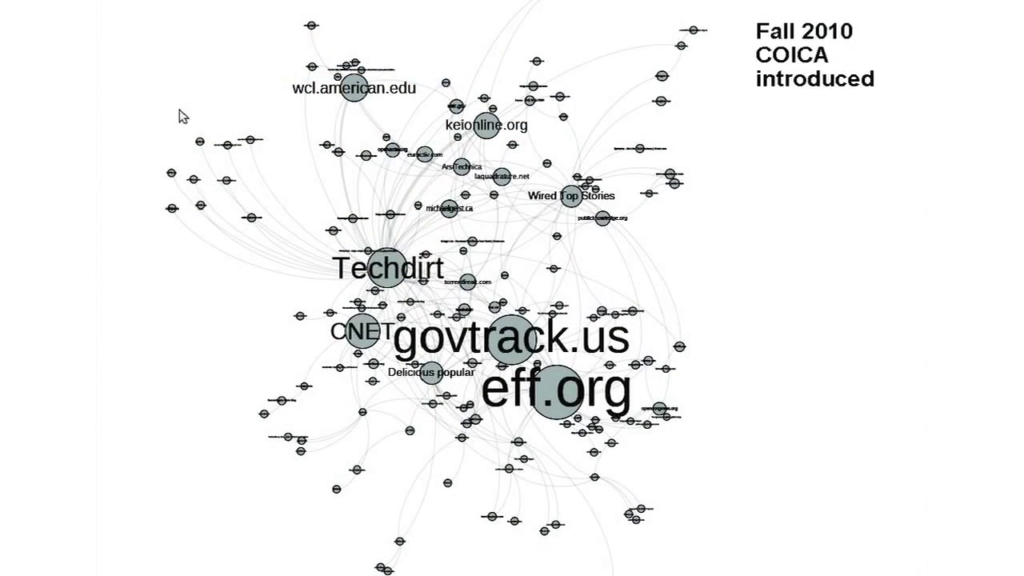
But that’s the less interesting version of the story. The more interesting version of the story is the development of network organization. So this is a snapshot out of about 13,000 stories over the last year and a half, related to SOPA and PIPA. This is a snapshot of how they’re connected and cite each other as of September/October 2010, when COICA comes out. What you see here is that it’s very much a tech media, a professional tech media story. Techdir, CNET, and EFF, as well as obviously a connection to the actual source.
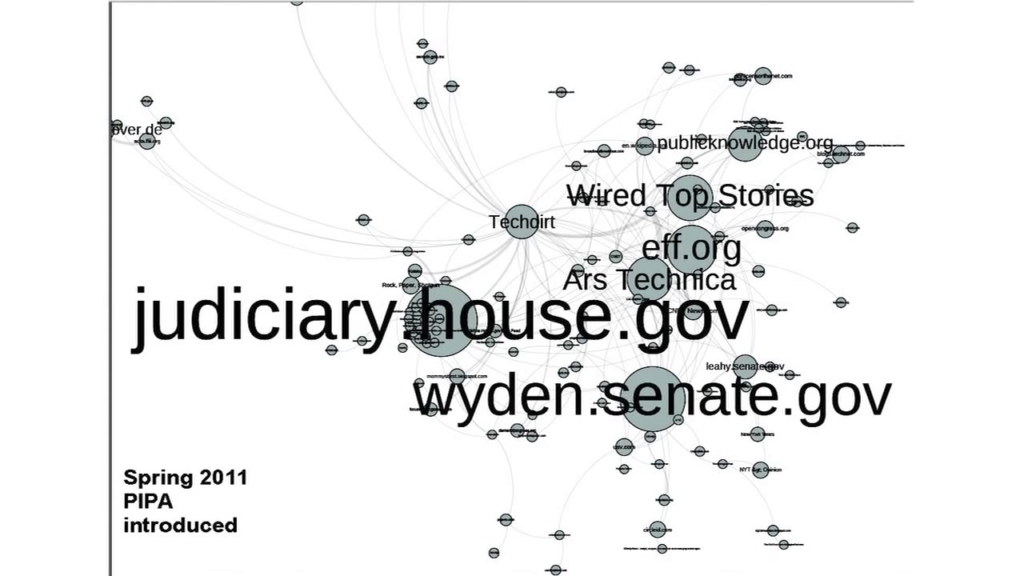
By the time PIPA comes out, by the time the Protect IP Act comes out in May of 2011, it shifts to being something central in DC, with Senator Ron Wyden playing a real role in trying to push this as a problem. I can’t hold on much longer.
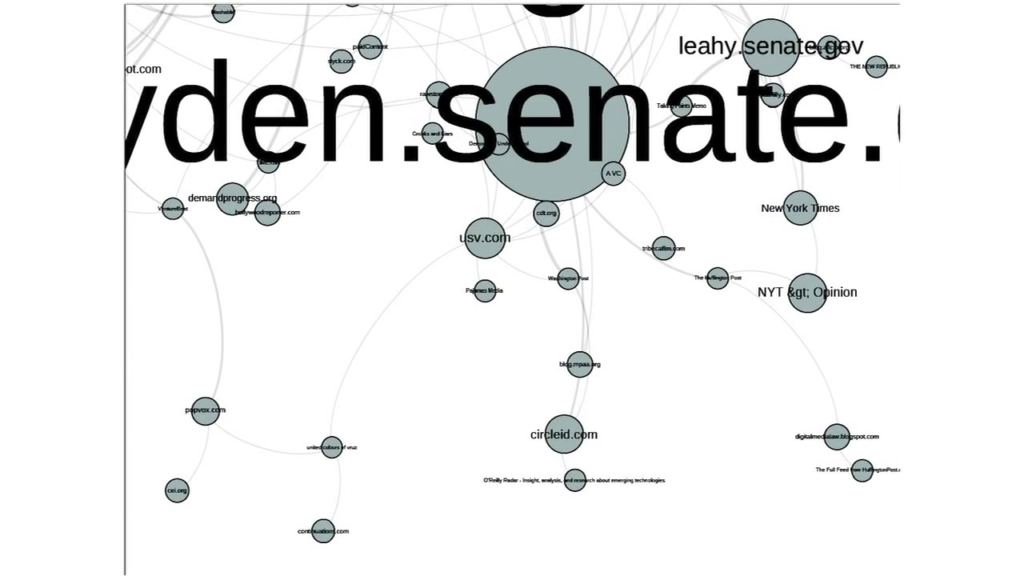
Some interesting things when you zoom in. So Wyden seems to be connecting very heavily to the New York VC community: Union Square Ventures, Fred Wilson over there. As well as to the left. You’ve Democratic Underground. You’ve Demand Progress here. You also see Public Knowledge emerging up there as a major site. And the beginnings up there of dontcensorthenet.com, which is really the approach that starts taking over by the time you get to the introduction of SOPA.
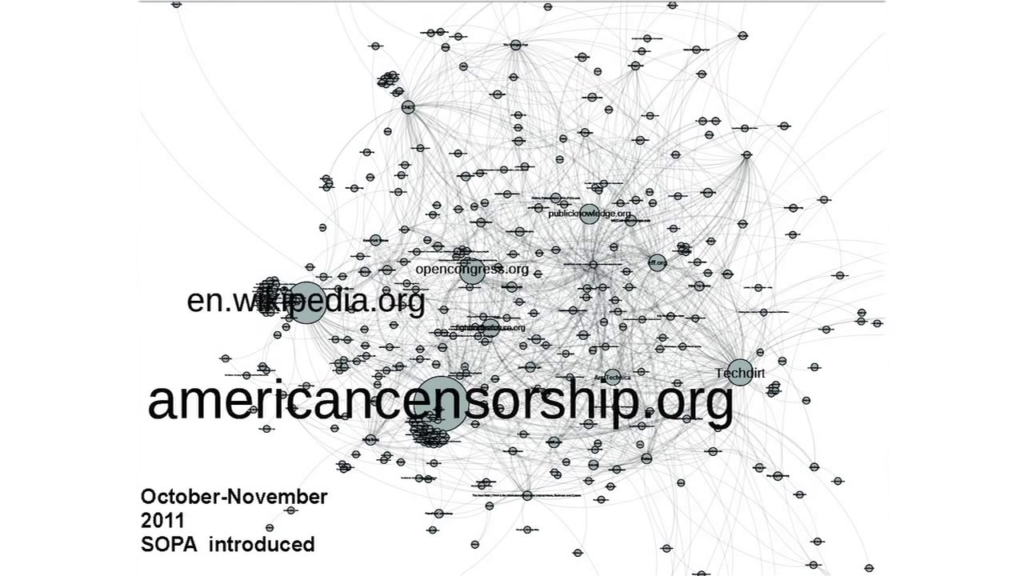
Something that wasn’t there before at all, americancensorship.org, which is direct action, right. A site that calls people to write their senators emerges out of nothing. The whole notion that we can’t have visibility on the net emerges out of nothing.
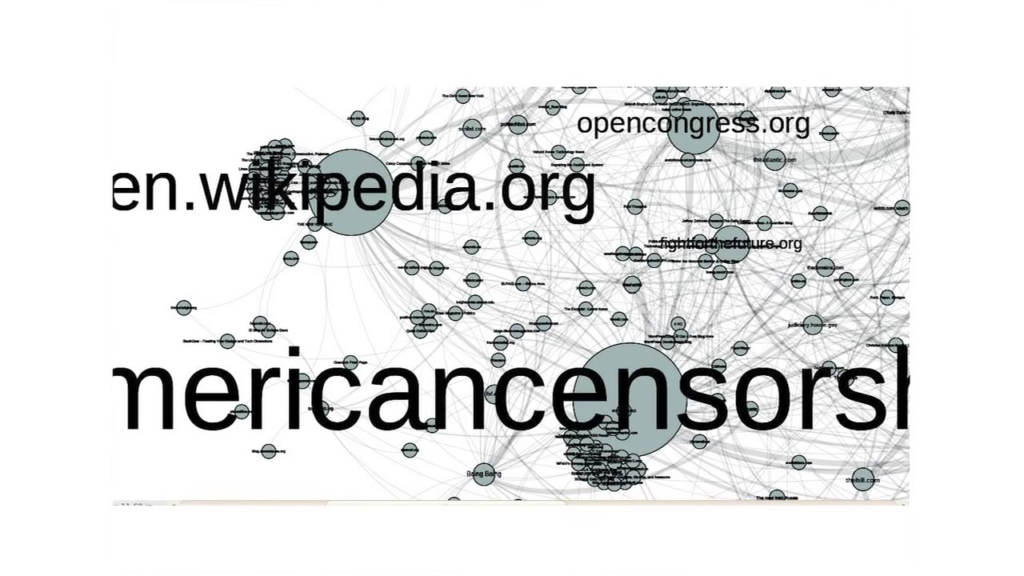
And if we zoom in on this sort of center area, what we see is direct action on the Web to try to get people to write their senators against these best-moneyed lobbies supported by both parties. So you see opencongress.org, a project funded by the Sunlight Foundation, and Participatory Politics Foundation. You see Fight for the Future, who are the people behind americancensorship.org, and you see the emergence of a Wikipedia.
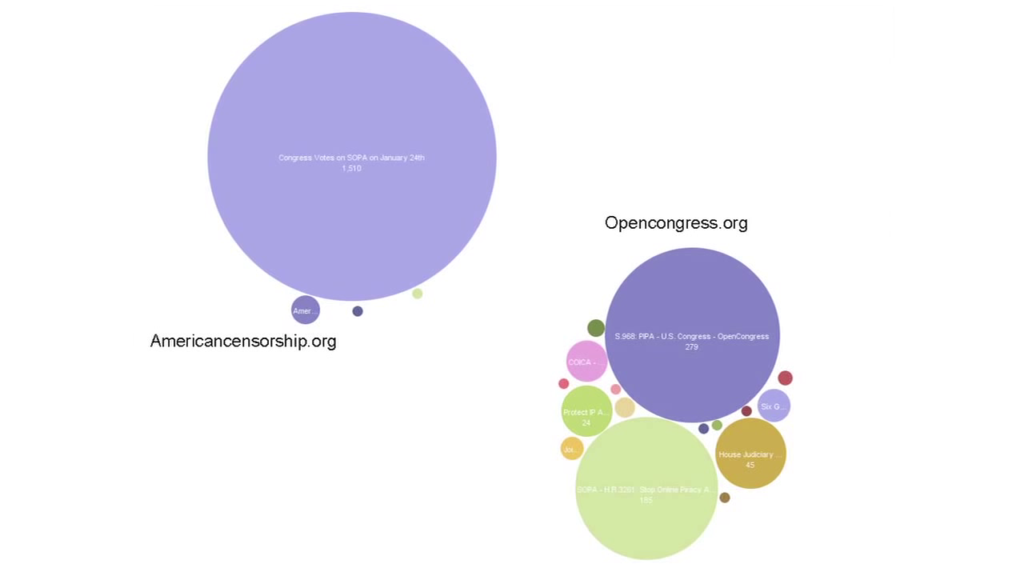
As that introduction and that particular first set of mailings goes out and we move on to the next day, you notice that the different sites have different roles. So americancensorship.org is just an action site. This reflects how many discreet pages or stories each site has links to. We see all of the sending over here to one action site. This is to primary materials, primarily.
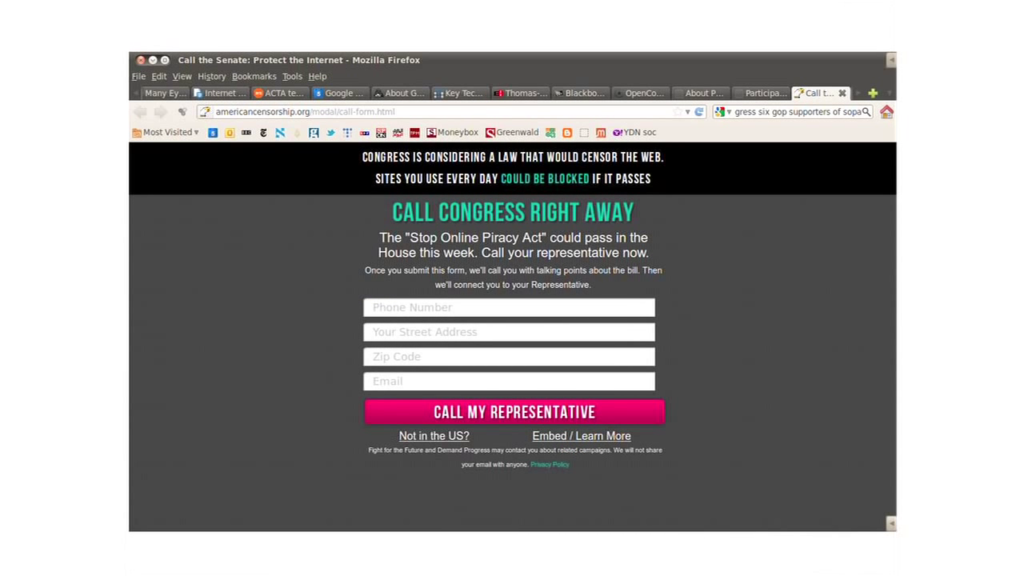
What’s that site? “Call Congress Right Away. Call my Representative.” A direct action site. This is what everybody is linking to. Let’s act.
When you look at Wikipedia, you see a combination of both information—a lot of the links are to just “what on Earth is SOPA?” Here Wikipedia’s got its neutral hat. But you also see organizing over here for political action. So this is Jimmy Wales’ user talk page where he sets up and says, “Let’s do something together. Let’s open up a poll,” and 1,800 people start debating about what Wikipedia should do.
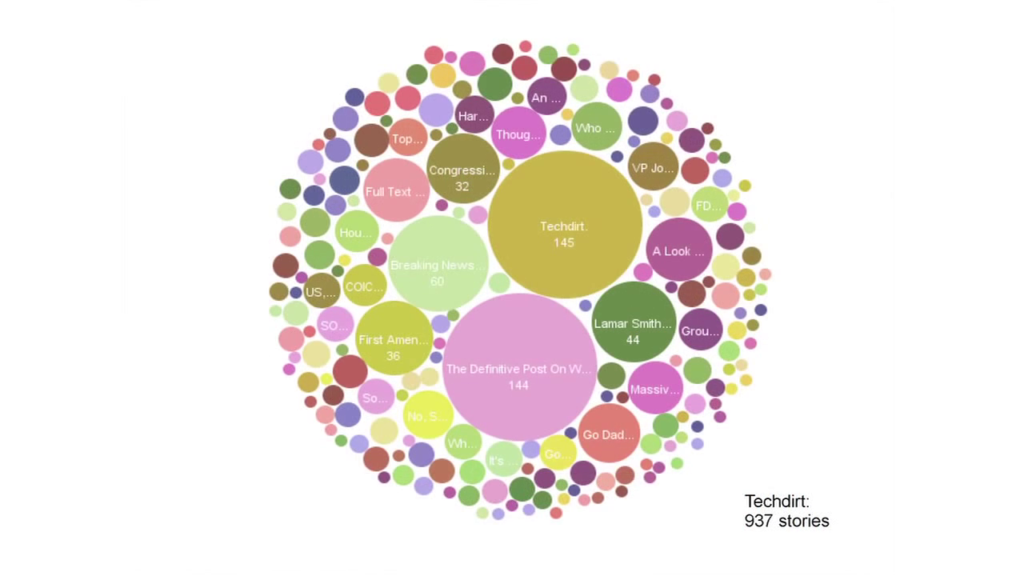
Techdirt on the other hand has lots and lots. Nine hundred thirty-seven different factual stories. This major story from November that tells all the details…turns out truth is stranger than fiction.
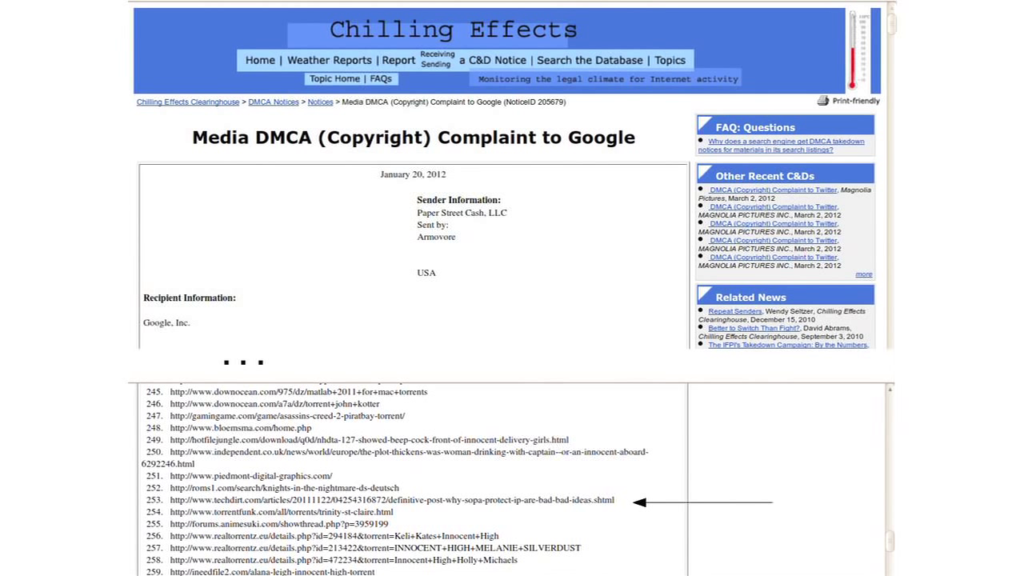
On January 20th, after the SOPA and PIPA failed, Google gets a DMCA takedown notice that says there’s copyright infringement in these hundreds of sites. And number 253 on this list is this Techdirt story which was the most cited-to during this period, which is a purely factual story. For a month you wouldn’t get it from Google search results, until Mike Masnick happened to notice by chance that this was the case and told Google, “Stop blocking me.” But for a month it was blocked.
By December, action subsided a little bit. Techdirt again became story people were looking for things. Reddit began to be more significant, and you had up more time for organizing on Wikipedia.
By January, action comes back to the center. We see Wikipedia. We see American Censorship coming up again. We see all sorts of particular groups. The New York Tech Meetup, you see ProPublica setting up a site to show who’s on which side and what money they had. You see the right wing blogosphere over here also connecting to this set of materials.
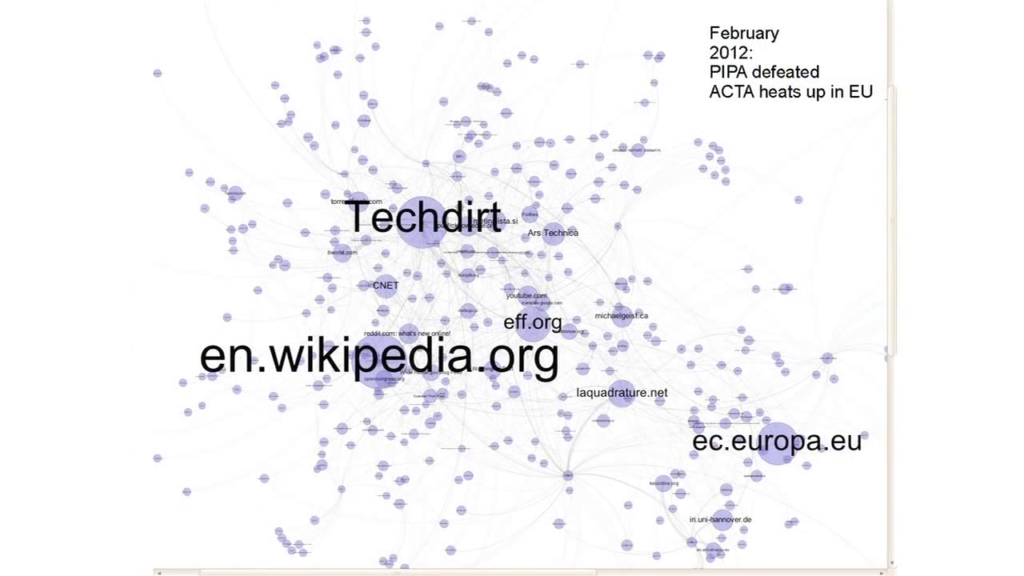
And by February look, it’s completely changed. All of the action sites, particularly American Censorship, are gone. We’ve won. And the action has shifted to Europe as the Europeans try to import the same model into ACTA.
You’ve got street protests in Poland and you’ve got Polish legislators donning Anonymous masks to stop this international treaty—it’s worse than SOPA.
What’s the story? To me the story is not mainstream media, which persist here but are relatively small. And it’s not necessarily blogs, which are also pervasive and everywhere. What’s interesting here is the particular surging role of technology media in feeding the story—online dedicated tech media. Of standing, long-term organizations dedicated to the area, which are much more effective and important in this field.
And a surprisingly large and important number of action item-specific sites where people ramp up, have direct action with a website. These are all sites that are specifically dedicated to this particular battle.
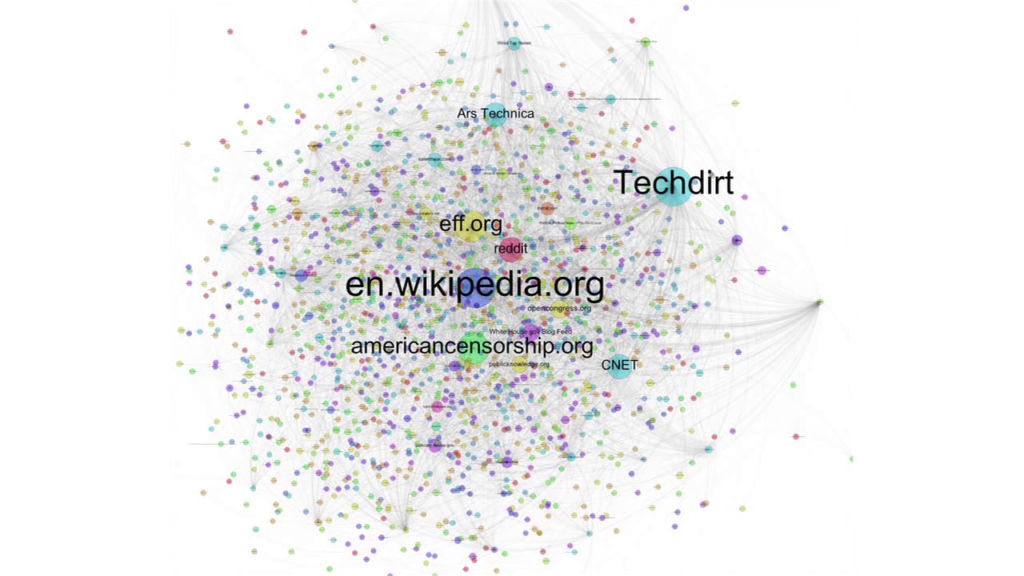
And most interesting? It’s this crazy quilt. It’s the fact that you have all of these different players, all of these different kinds of players—blogs and mainstream media organizations—all working together to completely shift the frame. This isn’t about fact-checking, it’s about frame-shifting through a combination of information, research, both neutral and activist as well as direct action.
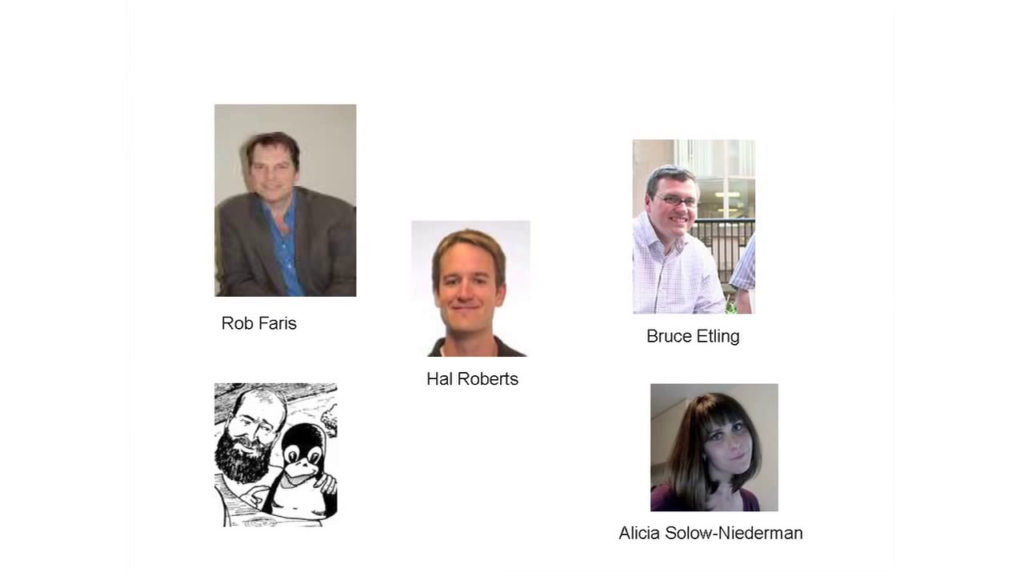
So this was an amazing team that pulled it together, and thank you to them here at Berkman. The four stories to me capture the problem of the state and its information, particularly in the context of national security. The problem of money in research about what the facts are. The problem of a discrete misinformation campaign that Fox News represents, and it’s not just a neutral thing it’s a particular instance. And the importance of nonprofit, standing professional fact-checking. And the possibilities for networked organization. And the ability to actually come together as a networked public sphere to shift the frame over a period of over a year, in the teeth of money and accepted wisdom, in the opposite direction. Thank you.
Further Reference
Truthiness in Digital Media event site
